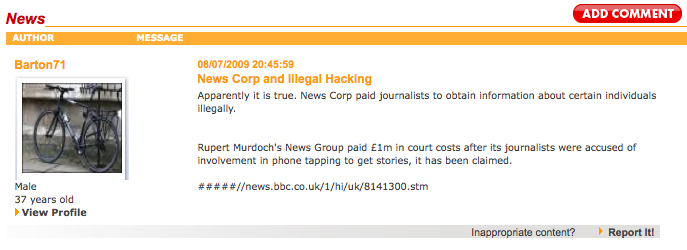When the incremental overhaul of the Guardian.co.uk enveloped the site’s homepage earlier this year there was much talk of the growing irrelevance of newspaper websites having a ‘front’.
Why a front when so many readers/users/visitors/viewers come in though the side door of search and RSS feeds?
Jeff Jarvis quoted figures that as few as 20 per cent of daily visitors get to see it.
Search engine optimisation – that’s the key isn’t it? With ubiquitous navigation from all parts of the site? Yes, truly it’s important. But is that the case for every user of a newspaper website?
Well, up to a point, Sir – as Mr Salter might say.
Let’s take that magic 20 per cent (I have to apologise for not knowing what this figure actually relates to, but I’ll use it as a starting point rather than a crux). Why would a fifth of daily users want to go in via the front door?
Perhaps they’re not fans of the Google hegemony, so avoid its referrals like the plague? Or not tech-savvy enough to master RSS feeds? Or pretty-much only want news from a single perspective, so rely on just one site as ‘the news’?
But what if accessing the news for them wasn’t as simple as scanning NewsFire or banging a search term into Google and quickly scanning a dozen or so relevant links?
What if navigating all the non-uniform sites linked to from Google News was a cripplingly slow nightmare?
What if the architecture of the sites they visit is as relevant – if not more relevant – than the slant those sites put on the news?
Well, if you’re a blind or partially sighted internet user that’s pretty much how it works.
Over the course of this week Journalism.co.uk is running a series of reports looking at difficulties blind and partially sighted users have accessing leading UK national newspaper websites.
To this end we asked a number of volunteers to show us, first-hand, the common problems they face. During our assessments the value of a homepage became strikingly obvious.
Our volunteers tended to start their internet news searches from the homepage of a favoured news site, rather than a search engine.
Our principal volunteer John Allnutt told us that he tended to glean his news from the BBC News site as it had simple navigation that he was used to using and its accessibility information was easily available.
Nothing so strange in that. Most people have favourites. But the tendency to surf differing sources of news isn’t common, we found, amongst those with visual impairment.
It became clear that once a user had got used to the unique and sometimes esoteric navigation of a news site, using screen reading technology, then logic prevailed. It’s easier and quicker to just go to the site where you know all the idiosyncrasies and curios, rather than getting stuck in the frustrating hamster-wheel of figuring out the complexities of other sites.
Furthermore, many news sites don’t have standardised design throughout, making it harder still to jump into a certain section and expect it to be laid out and navigable in the same way as the rest of the site. Easier then just to enter through the home page and to use that as the fulcrum to all your movements around the site.
Our observation isn’t just limited to the individuals we worked with on the project.
Trenton Moss, director of Web Credible, a web usability and accessibility consultancy that helped us in the early part of the project, told us that this is a common phenomenon.
Blind and visually impaired individuals will continue to use these sites in spite of their flaws he told us, perfecting use of the imperfect navigation of a single or a few sites from the homepage to access news online.
There is no ubiquity of design that would allow the blind and visually impaired user to easily float between news sites and utilise search engines as the easy and quick route to news they want.
Ubiquitous design across a range of news websites isn’t something that’s likely to happen soon, if ever.
It’s because of this that front pages remain important as a point of entry for navigation and an easily accessible summation of all that is important.


